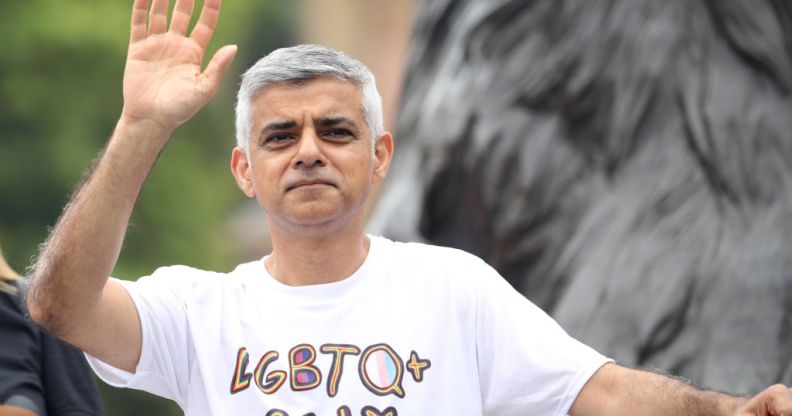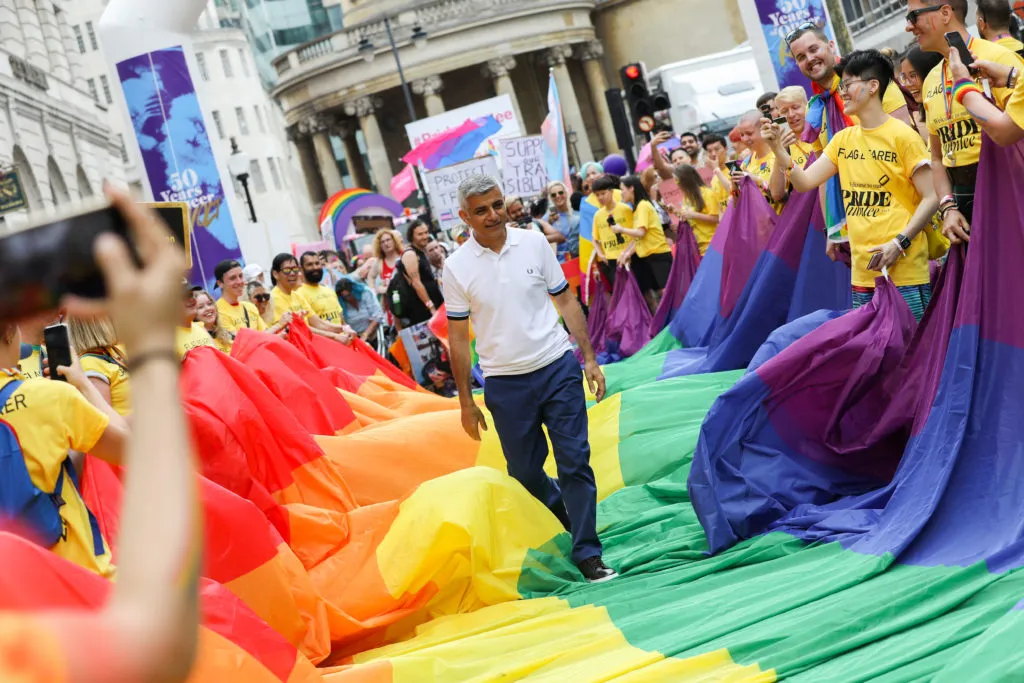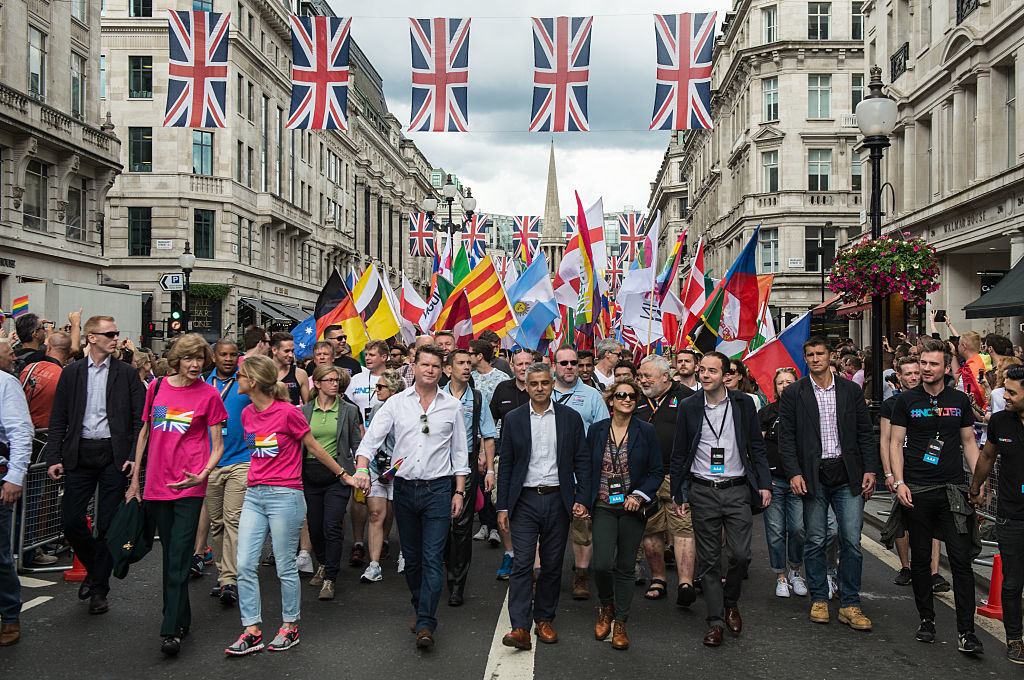Sadiq Khan vows to make London ‘the first city to end new HIV transmissions’

Mayor of London Sadiq Khan waves during Pride in London 2019. (Mike Marsland/WireImage for Pride in London)
Sadiq Khan has vowed that London will become “the first global city to end new HIV transmissions by 2030″ as he fights for reelection.
Khan announced the pledge on Thursday (25 March) as part of his manifesto, which will be released in full next month ahead of the mayoral election in May.
The 2030 date places the mayor in line with a UK government target, with the nation having already beaten global 2020 targets for HIV prevention.
Khan’s plan to cut new transmissions revolves around improved education and an “opt-out, rather than opt-in” approach to regular HIV testing.
“Testing is key,” Khan told PinkNews. “At the moment, you’ve got to ask for as part of the blood they take test also for HIV.
“We think by having an opt-out system, you can normalise, the issue of being tested regularly for HIV when you’re having a normal blood test for other issues.”
He also stressed the importance of combatting HIV stigma.
“One of the things we’ve got to do to make that a reality is to get rid of the stigma, and for us to talk about it more openly,” Khan said.
“And that means getting not just people from the LGBT+ community to talk about it more openly, but people like me talking about it more openly as well.”
Sadiq Khan: ‘Some of my gay friends were beaten up’
For Sadiq Khan, his drive to improve LGBT+ lives stems back to the injustices he witnessed as a young man.
The 50-year-old grew up in Tooting, south London in the throes of the AIDS epidemic that seized the city in the 1980s.
While politicians initially shrugged off the pain and deaths of countless queer people, the virus ravaged London’s queer community – including Khan’s friends.
The hostility whipped up against queer people at the time, Khan told PinkNews, was one of his biggest drivers to introduce the pledge. “It was in my self-interests,” he said.
“The attitude there was when I was growing up against gay people, in particular, was awful,” Khan recalled. “I’m afraid what was very common was ‘gay bashing’.
“Clapham Common near to my home was a place where if you were gay, it’d be wise to avoid because you would get beaten up or chased out of the Common,” noting that “some of [his] gay friends were beaten up” in the park.

London Mayor Sadiq Khan during the parade at Pride in London 2019. (Tristan Fewings/Getty Images for Pride in London)
“I also remember the attitudes and language used denigrating people because of who they are, who they love, and it was awful. Many people suppressed who they were, many people hated who they were and it was never talked about.
“I also happen to have close friends who have HIV who have productive, meaningful lives and that’s because of the advances in science.”
“Some of my mates still suffer discrimination,” he added, “some overt, some subtle and covert, and we’re going to root it out.
“The way to root it out is recognising that our diversity isn’t a weakness, it’s a strength. I would love London to be a beacon, not just for the country, but the rest of the world.
“We can’t just be grateful for what we have – we’ve got to make sure we continue to make progress, but also campaign and look for others as well.
“It’s really important that we don’t take for granted the progress. It can go backwards.”
Khan reflected on his own experiences of receiving hate for standing up for LGBT+ rights.
“I remember when I was a member of parliament [for Tooting], voting for same-sex marriage and receiving death threats and fatwas against me.
“You’ve got to be bold, courageous and brave in these sorts of issues.
“Of course, there’ll be life receiving death threats against you, but it’s the price we pay for progress and we need to make sure we stand shoulder to shoulder with our communities, who sometimes are discriminated against because of just who they are.”
What would the HIV pledge mean for Londoners?
London carries the highest rate of HIV in Britain, with 36 per cent of new diagnoses in 2019 being London residents, according to the Terrence Higgins Trust, an HIV charity.

(Getty Images)
Khan’s vow comes after London sexual health clinic 56 Dean Street claimed that the coronavirus pandemic has helped “break” chains of new HIV cases.
The undertaking caps off Khan’s track record as an outspoken LGBT+ ally during his first term as mayor of London.
In his first term, London both met and topped the United Nation’s 90:90:90 target, a global effort to ensure that 90 per cent of all people know their HIV status by 2020.
The target also included providing 90 per cent of people living with the virus with antiretroviral therapy and 90 per cent of them having viral load suppression, which means they cannot pass on the virus to others.
Among his manifesto pledges, Khan said his mayorship would pledge to reel in anti-LGBT+ hate crime rates in London as part of his policing and crime plans.
Khan also said that if elected, he would launch increased protections for embattled queer venues and spaces which have been financially pelted by the coronavirus pandemic.
He previously announced padded emergency funds to keep countless queer theatres, bars, pubs and clubs afloat while lockdown measures kept their doors shuttered.

